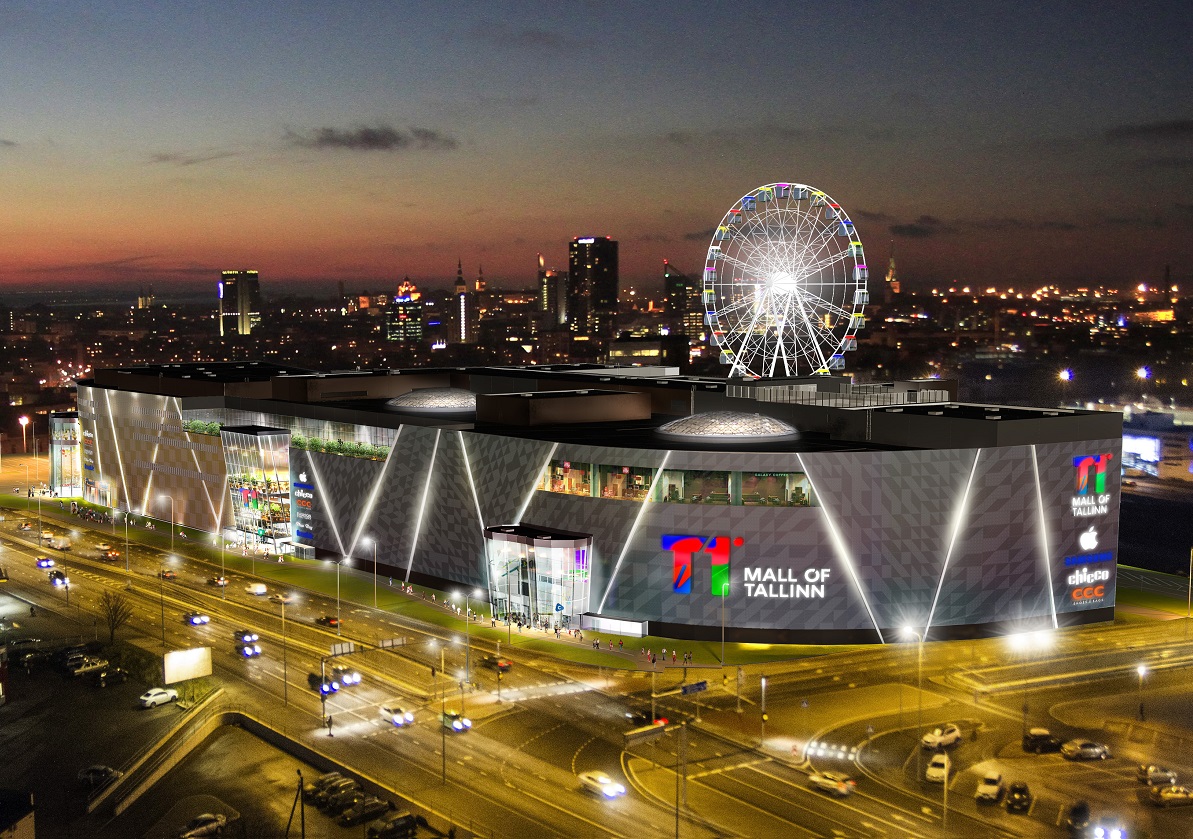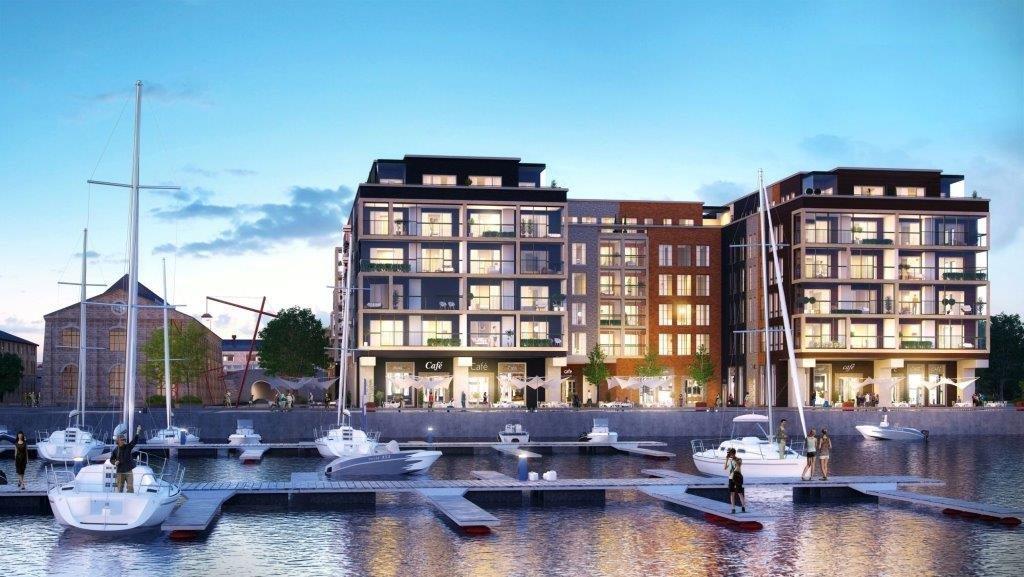Real estate markets of the capital cities of the Baltic countries – productive year behind and ahead
 As it was expected and forecast, the year 2018 was truly active in the real estate markets of the Baltics. In the environment of the growing economy, high supply and demand indicators continue to be recorded in the capitals of the Baltics and other major cities. As noted in the latest annual real estate market report of the capital cities of the Baltics by Ober-Haus, the upward trend is observed both in the commercial and residential property markets.
As it was expected and forecast, the year 2018 was truly active in the real estate markets of the Baltics. In the environment of the growing economy, high supply and demand indicators continue to be recorded in the capitals of the Baltics and other major cities. As noted in the latest annual real estate market report of the capital cities of the Baltics by Ober-Haus, the upward trend is observed both in the commercial and residential property markets.
“If since the last economic downturn we have seen a sufficiently rapid recovery in the real estate markets of the capital cities of Estonia and Lithuania, the capital of Latvia, Riga, could not boast of greater changes. It seems, however, that the largest city of the Baltic countries is finally entering into a faster development phase,” Raimondas Reginis, Research Manager for the Baltics at Ober-Haus, said.
Leap in supply in the office market in Riga in 2019–2020
In 2018, 80,000 sqm of new office space was built in Tallinn, 43,000 sqm in Vilnius and nearly 25,000 sqm in Riga. Although in terms of the new office space, Riga was again behind Tallinn and Vilnius in 2018, according to Mr Reginis, the office sector in the biggest city in the Baltics is gaining momentum. According to Ober-Haus, a significant amount of office space of up to 140,000 sqm should supplement the market in Riga in 2019–2020.
“In the next two years developers in Riga plan to build as much office space as there was built in the past nine years (2010-2018). This is exactly what the capital city of Latvia lacked in order to compete with Vilnius and Tallinn for the attention of international companies. A possibility not only to get established, but also to plan any further expansion in modern buildings is one of the main factors for bringing larger companies to a specific region or city,’ Mr Reginis pointed out.
Vilnius and Tallinn, however, are not going to give up their positions as leaders in the office space development in the past decade easily and are also preparing for new impressive office developments. According to Ober-Haus, at least 15 projects are planned to be implemented in Vilnius in 2019–2020, offering a useful office space of about 160,000 sqm. In Tallinn, about 100,000 sqm are planned to be built during the same period.
Two new large shopping centres in Tallinn and Riga
 In the sector of traditional larger shopping centres, Tallinn and Riga had the biggest news in 2018–2019. Following the opening of T1 Mall of Tallinn at the end of 2018 the market in Tallinn was supplemented with 55,000 sqm of retail space. According to Ober-Haus, the retail space in traditional shopping centres in the capital of Estonia at the end of 2018 totalled 665,300 sqm and with 1.54 sqm per capita remains the obvious leader among the capitals of the Baltics.
In the sector of traditional larger shopping centres, Tallinn and Riga had the biggest news in 2018–2019. Following the opening of T1 Mall of Tallinn at the end of 2018 the market in Tallinn was supplemented with 55,000 sqm of retail space. According to Ober-Haus, the retail space in traditional shopping centres in the capital of Estonia at the end of 2018 totalled 665,300 sqm and with 1.54 sqm per capita remains the obvious leader among the capitals of the Baltics.
In the meantime, after a long break one of the largest retail projects was implemented in Riga. In April 2019, Akropole shopping centre was opened supplementing the market in Riga with around 60,000 sqm of retail space. In terms of the retail space per capita, Riga came second in 2018 among the capitals of the Baltics (649,000 sqm or 1.02 sqm/capita). Following the opening of Akropole, the retail space indicators in Riga increased by a tenth.
“Despite the opening of smaller scale projects and DIY type schemes (Žali, Depo, Decathlon) in Vilnius in 2018, no larger traditional shopping centres were built,” Mr Reginis said. Opening of a larger project can be expected at the end of 2020, when the Vilnius Outlet shopping centre will be opened next to the western bypass of the city supplementing the market in the capital with about 35,000 sqm of retail space. The project of this type will be implemented in Vilnius after a break of 4.5 years (since the opening of the second stage of Nordika shopping centre in May 2016). According to Ober-Haus, the retail floor area in the traditional shopping centres in Vilnius at the end of 2018 totalled 453,000 sqm or 0.82 sqm per capita, the smallest figure out of the capital cities of the Baltic countries.
200,000 sqm new warehousing space in the capitals of the Baltics countries
In 2018, the capital cities of the Baltics and their environs saw particularly huge volumes of construction of warehousing facilities. “The growing demand for modern warehousing space and high occupancy rates create conditions for much faster expansion of this sector,” Mr Reginis said. The vacancy rate of modern warehousing premises in the Baltics is under 5%.
According to Ober-Haus, a total of 16 projects were implemented in the capital cities and their environs in 2018, offering a little over 200,000 sqm of warehousing premises: about 86,000 sqm in Tallinn, about 60,000 sqm in Riga and nearly 58,000 sqm in Vilnius.
The largest supply of modern warehousing facilities in the Baltic countries is in Tallinn and its environs. At the end of 2018, the total area of these premises in Tallinn was over 1.3 million sqm. Meanwhile in Riga and its environs the total area of warehousing premises increased by 9% in 2018 totalling almost 709,000 sqm. According to Ober-Haus, the supply of warehousing premises in Vilnius and its environs increased by 11% in 2018 and at the end of the year totalled slightly over 585,000 sqm.
“Unlike in Estonia and Latvia, where the warehousing sector is mainly concentrated in the country’s capitals and its surroundings, Lithuania has other regions with sufficiently active development of warehouses. The supply of warehousing premises in Kaunas and Klaipėda regions alone totals almost 550,000 sqm,” – Mr. Reginis noted.
According to the representative of Ober-Haus, the development of warehousing facilities gained impetus and shows no signs of stopping soon. In 2019, a considerable increase in such property is planned in the capitals of the Baltics. Projects of different size are planned which will offer approximately 130,000 sqm of warehousing space.
Tallinn is catching up with Vilnius according to the construction volumes of multi-apartment buildings
 In 2018, the fastest leap in the supply of apartments in the capitals of the Baltic countries was recorded in Riga. A little over 2,400 apartments were built in a year or 65% more than in 2017. “Of course, the scale of apartment development in Riga still lags behind that in Vilnius and Tallinn, but the leap shows much more ambitious steps taken by developers,” the representative of Ober-Haus noted. In 2018, over 4,300 apartments (5% more than in 2017) were built in Vilnius and 3,100 apartments were built in Tallinn (7% more than in 2017).
In 2018, the fastest leap in the supply of apartments in the capitals of the Baltic countries was recorded in Riga. A little over 2,400 apartments were built in a year or 65% more than in 2017. “Of course, the scale of apartment development in Riga still lags behind that in Vilnius and Tallinn, but the leap shows much more ambitious steps taken by developers,” the representative of Ober-Haus noted. In 2018, over 4,300 apartments (5% more than in 2017) were built in Vilnius and 3,100 apartments were built in Tallinn (7% more than in 2017).
Despite the fact that according to the quantity of new apartments Vilnius retained the position of the leader among the capitals of the Baltics in 2018, Tallinn is rapidly catching up. According to Ober-Haus, in 2014–2016, on average 6.1 apartments were built per 1,000 population in Vilnius annually and in 2017–2019 the figure will increase to 7.9 apartments. At the same time in Tallinn on average 3.9 apartments per 1,000 population was built annually in 2014–2016 and in 2017–2019 the figure will jump to 7.1 apartments.
“It means that in terms of the number of apartments built in Tallinn, it is only by a tenth percentage points behind Vilnius,” Mr Reginis said. At the same time, despite a significant rise in the number of new apartments built in 2018 in Riga, the volumes of apartment construction in Riga remain modest and the figure is more than half that of Vilnius and Tallinn. According to Ober-Haus, in 2017–2019, the figure will be 3.1 completed apartments per 1,000 population in Riga.
“It is obvious that 2019–2020 will certainly not be boring in the real estate markets in the Baltic countries and will be eventful. The economic environment continues to remain favourable for active development of the market in the main regions of these countries. It is clear that developers are not going to miss this opportunity,” Mr Reginis said.
Latest news
 All news
All news

“e-market city” completes its second phase – the development of a modern “stock office” type shopping town continues
"e-market city", an online and wholesale shopping town located in a business-friendly location at the intersection of Eišiškių pl. and Geologų Street, is rapidly approaching the end of its second phase. The final construction works are currently underway and the first tenants of the new phase are preparing to move in as early as June-July. "The predominant floor areas of e-market city - ranging from 370 to 960 m² - are easily combinable and adaptable to a wide range of commercial activities. Existing and potential tenants appreciate the easy accessibility, high quality of construction and fitting-out, functional layout and solid neighbourhood, where well-known companies such as Assa Abloy, Dextera, Skuba, Skuba, Maidina, Šildymas plius, YE International, etc. are already located. The first phase is already 100% leased, while the second phase is still available - we invite you to get in touch", says Remigijus Valickas, Commercial Real Estate Projects Manager at Ober-Haus. The project is being developed in three phases on an area of 3.9 ha. The total area of the buildings will exceed 20,000 m² and the total investment in the project will amount to more than EUR 25 million. For more information about the project and leasing opportunities,…

The recovery of a very strong-looking housing market may slow down
The Ober-Haus Lithuanian apartment price index (OHBI), which follows changes in apartment sale prices in the five biggest Lithuanian cities (Vilnius, Kaunas, Klaipėda, Šiauliai and Panevėžys) increased by 0.5% in March 2025. The annual apartment price growth in the biggest cities of Lithuania was 4.3% (a 4.1% increase was recorded in February 2025). In March 2025 apartment prices in Vilnius, Kaunas, Šiauliai and Panevėžys increased by 0.4%, 1.3%, 0.4% and 0.2%, respectively, with the average price per square meter reaching EUR 2,680 (+10 EUR/sqm), EUR 1,846 (+24 EUR/sqm), EUR 1,172 (+4 EUR/sqm) and EUR 1,149 (+2 EUR/sqm). In the same month, apartment prices in Klaipėda decreased by 0.1% and the average price per square meter dropped to EUR 1,752 (-2 Eur/sqm). In the past 12 months, the prices of apartments increased in all the biggest cities in the country: 3.3% in Vilnius, 5.6% in Kaunas, 5.4% in Klaipėda, 6.5% in Šiauliai and 6.4% in Panevėžys. "At the beginning of 2025, the country's housing market is showing impressive results. After a very strong growth in housing transactions in January and February this year, the increase in the number of transactions continued in March. According to the data of the State Enterprise…

Housing market has woken up, but no faster price growth yet
The Ober-Haus Lithuanian apartment price index (OHBI), which follows changes in apartment sale prices in the five biggest Lithuanian cities (Vilnius, Kaunas, Klaipėda, Šiauliai and Panevėžys) increased by 0.4% in February 2025. The annual apartment price growth in the biggest cities of Lithuania was 4.1% (a 4.0% increase was recorded in January 2025). In February 2025 apartment prices in Vilnius, Kaunas, Klaipėda, Šiauliai and Panevėžys increased by 0.3%, 0.1%, 0.8%, 0.8% and 0.9%, respectively, with the average price per square meter reaching EUR 2,670 (+7 EUR/sqm), EUR 1,822 (+2 EUR/sqm), EUR 1,754 (+13 EUR/sqm), EUR 1,168 (+10 EUR/sqm) and EUR 1,147 (+10 EUR/sqm). In the past 12 months, the prices of apartments increased in all the biggest cities in the country: 3.2% in Vilnius, 4.1% in Kaunas, 6.2% in Klaipėda, 6.6% in Šiauliai and 6.7% in Panevėžys. ‘As predicted, a rapid annual growth in the number of housing transactions is recorded at the beginning of 2025. According to the data of the State Enterprise Centre of Registers, 40% more apartments were purchased in the country in January this year and 39% more in February this year than in the same month in 2024. It should be noted that in the…
 All news
All news


